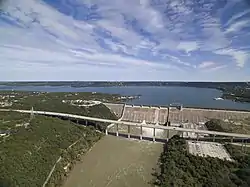Mansfield Dam
Mansfield Dam (formerly Marshall Ford Dam) is a dam located across a canyon at Marshall Ford on the Colorado River, 13 miles (21 km) northwest of Austin, Texas. The groundbreaking ceremony occurred on February 19, 1937, with United States Secretary of the Interior Harold L. Ickes attending. The dam was a joint project by the Lower Colorado River Authority (LCRA) and the United States Bureau of Reclamation, with partial funding provided by the Public Works Administration. Brown and Root, headed by James E. Walters, Sr., was the prime contractor.[1] The dam was completed in 1941. Originally called Marshall Ford Dam, the name was changed in 1941 in honor of United States Representative J.J. Mansfield. The reservoir behind Mansfield Dam is named Lake Travis. The dam is owned and operated by the LCRA.
| Mansfield Dam | |
|---|---|
 Mansfield Dam in November of 2018 | |
| Official name | Mansfield Dam |
| Location | Travis County, Texas, USA |
| Coordinates | 30°23′32″N 97°54′26″W |
| Construction began | 1937 |
| Opening date | 1941 |
| Operator(s) | Lower Colorado River Authority |
| Dam and spillways | |
| Impounds | Colorado River |
| Height | 278 feet (85 m) |
| Length | 7,089 feet (2,161 m) |
| Width (base) | 213 feet (65 m) |
| Spillway type | 24 controlled (paradox and jet-flow gates) |
| Spillway capacity | 130,000 cu ft/s (3,700 m3/s) (23 floodgates at 5,250 cfs; 1 variable discharge gate at 2,285 cfs 2 turbines at 4,100 cfs, 1 turbine at 2,400 cfs) |
| Reservoir | |
| Creates | Lake Travis |
| Power Station | |
| Installed capacity | 108 MW |
Mansfield Dam is 278 feet (85 m) high, 7,089 feet (2 km) long, and 213 feet (65 m) thick at the base. The concrete gravity dam with embankment wings and saddle dikes was designed to control flooding; to store 1.4 km³ (369 billion US gallons) of water; and to generate hydroelectric power (108 megawatts). The Spillway Elevation is 714 feet above Mean Sea Level (MSL). LCRA begins to open floods gates when water reaches 681 feet above MSL. At 681 feet above MSL, discharge capacity exceeds 130,000 cfs as the lake rises.
A two-lane highway, RM 620, crossed the top of the dam, but traffic congestion brought on by the growth of the city of Austin and expanded popularity of recreation at Lake Travis forced the state to build a four-lane highway bridge on the downstream side of the dam, and RM 620 was rerouted over that bridge. Traffic is no longer allowed on the road across the dam, except for service vehicles.
Political History
Lyndon B. Johnson ran for his first elected office as United States Representative for Texas's 10th congressional district (where the Mansfield Dam was located). His campaign was backed by the dam's contractors, and his success in clearing funding and regulatory hurdles for the dam shortly after his election is considered a cornerstone of his future political career. [2]
References
- "Guide to the Brown & Root / George R. Brown Executive Files, 1937-1978 MS 488". www.lib.utexas.edu. Retrieved 2017-03-22.
- Caro, Robert (1982). The Years of Lyndon Johnson: The Path to Power. Alfred A. Knopf. pp. 648 and Chapters 20, 22, and 23. ISBN 978-0679729457.
